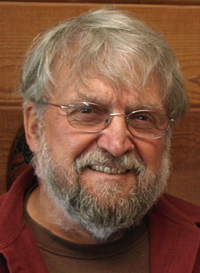Campus News
Biologist John Pearse awarded California Academy of Sciences Fellows’ Medal
The California Academy of Sciences has awarded its highest honor, the Fellows’ Medal, to UCSC biologist John Pearse.

OLYMPUS DIGITAL CAMERA
The California Academy of Sciences has awarded its highest honor, the Fellows’ Medal, to John Pearse, professor emeritus of ecology and evolutionary biology at UC Santa Cruz. This award is given to especially prominent scientists who have made outstanding contributions to their scientific fields.
In addition, two UC Santa Cruz professors are among the 15 new fellows elected to the California Academy of Sciences in 2011. They are Donald Croll, professor of ecology and evolutionary biology, and James Zachos, professor of Earth and planetary sciences. Frank Drake, professor emeritus of astronomy and astrophysics, was named an honorary fellow of the academy.
Academy fellows are distinguished scientists who have made notable contributions to one or more of the natural sciences. They are nominated by their colleagues and appointed by the board of trustees to govern the academy. Induction of new fellows and presentation of the Fellows’ Medal will take place at the academy’s annual meeting in October.
Pearse is an expert on marine invertebrates with a focus on their reproductive biology and role in the rocky intertidal and kelp forest ecosystems. He has done important research along the California coast and at sites ranging from Antarctica to Japan. Although he retired in 1994, he continues to teach, conduct research, and write as a professor emeritus affiliated with UCSC’s Institute of Marine Sciences (IMS). He is working with high school students to monitor the intertidal through the LiMPETS program. His wife, Vicki Pearse, is an IMS research associate, and they were both honored in 2008 with a lifetime achievement award from the Western Society of Naturalists. Together with Vicki’s parents, Ralph and Mildred Buchsbaum, they revised the classic invertebrate zoology textbook Animals Without Backbones and wrote another, Living Invertebrates, first published in 1987. John Pearse has served as president of the California Academy of Sciences, the Society for Integrative and Comparative Biology, and the International Society of Invertebrate Reproduction.
Croll employs science to identify and prioritize conservation problems, working with agencies and nongovernmental organizations to develop and test cost-effective solutions. His primary research focuses on the ecology and conservation of marine mammals and seabirds, and the habitats upon which they depend. He is a cofounder of the nonprofit group Island Conservation. His “Wind to Whales” program in the Monterey Bay National Marine Sanctuary focuses on how physical and biological factors explain and ultimately may be used to predict the distribution of large, highly mobile marine predators.
Zachos studies marine environments in Earth’s past by analyzing evidence in the layers of sediments deposited on the seafloor. He and his students use the chemical compositions of fossils and other clues to reconstruct climate conditions and ocean chemistry during past episodes of extreme climates. His research focuses on the major climate shifts during the past 65 million years, such as the Paleocene-Eocene Thermal Maximum (PETM). This work is highly relevant to understanding how human activities are driving modern-day global climate change.
Drake is the former director of the SETI Institute’s Carl Sagan Center for the Study of Life in the Universe. For over 50 years, he has been asking, “What are the chances of life existing outside our solar system?” This question led Drake to formulate an equation that quantifies the likelihood of intelligent life elsewhere in our galaxy. He participates in an ongoing search for optical signals of intelligent origin, carried out at Lick Observatory using the 40-inch Nickel telescope. A member of the National Academy of Sciences, he has served as dean of Natural Sciences at UC Santa Cruz, president of the Astronomical Society of the Pacific, and director of the Arecibo Observatory.
The California Academy of Sciences is an international center for scientific education and research and is at the forefront of efforts to understand and protect the diversity of Earth’s living things.